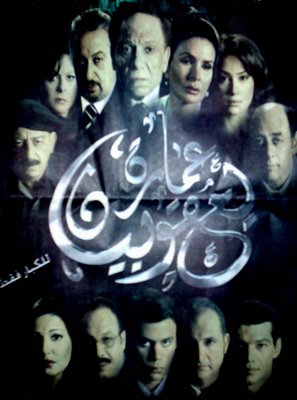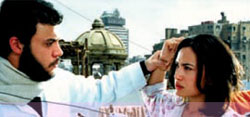Yacoubian Building

"Yacoubian Building" is an Egyptian movie worth mentioning. Starring Adel Imam, Yousra, Nour El-Sherif, Hend Sabri, Khaled El-Sawi, Khaled Saleh and the new face Mohamed Imam. Directed by the first-timer, Marwan Hamed. The movie tackles many controversial themes like homosexuality, terrorism and adultery. Accentuating the life of different classes in Egypt and showing the interaction between them. The movie is based on Alaa El-Aswani's novel "Yacoubian Building".
People come and go but buildings are always there witnessing history. Yacoubian Building is one of the oldest buildings witnessing the Egyptian history. Built in 1934 by the millionaire Hagob Yacoubian- still standing till this day in Suliman Pasha street- was originally built for the Armenian colony, rich and high class society business men resided in this building, even some very rich Jews lived there. Nowadays, it is reportedly a little down-in-the-dumps.
The movie opens by telling the history of people coming and going to this building, focusing on the lives of the contemporary residents, of different classes of society, from the pasha to the door keeper. Dramatizing the life of the different classes in contemporary Egypt.
Adel Imam plays the role of Zaki Pasha, a womanizer who totally depends on his inheritance. He lives in the family house with his sister Dawlat. Problems start to rise between the two siblings and they turn against each other. Dawlat is very greedy and wants to kick her brother from the family house. He is trying to live the "western life style" as he called it. Having an open relationship with Yousra playing the role of Christine a pianist. Yet at the end he falls in love with Hend Sabri, Bosaina, a low standard poor girl, from the roof residents.
Nour El-Sherif plays the role of Haj Azzam, who rose from a shoeshine boy to a successful business man. His character is of great importance. He dramatizes the people who disguise behind religious masks, while their true natures are corrupt. He only rose that fast from low class to high class by drug dealing. His character also shows the risky life of business men who are involved into politics. Accentuating the dirty pressures performed by big governmental figures on successful business men. He also proves to be a non religious person driven by his lust. He gets married at very old age, to only satisfy his sexual desires, so he marries Soad, played by Summaya El-Khashab, a widow working hard to raise her child. He takes advantage of her bad financial situation, separates between he and her only son and forbids her from getting children. His injustice reaches it's climax when he heirs some gangsters to force her to abort the baby. Everything he does is completely against religion.
The controversial life of homosexuals is portrayed by the role of Khaled El-Sawi, playing the role of Hatem Rashid, the editor of "Le Caire" newspaper. The only son of a successful Egyptian lawyer and a French mother. In his childhood he was always seeking the attention of his parents but with no reaction from them, they always told him to go away and be quiet. He found no one at home to play with him except for Edris the servant, who introduced him to the underworld of homosexuals. Hatem never got Edris out of his mind. He was involved in many sexual relations with men. One day, walking in the street, wasted from drinking, he sees Abd-Rabo, a well built poor soldier, Hatem is attracted to him and immediately remembers Edris, He gives him money and invites him to a fancy dinner, then takes him back home with him. Abd-Rabo wakes up in the morning tortured by the guilt of the horrible sin, while Hatem, like a devil, comforts him and convinces him that what they are doing is not wrong at all.

Mohamed Imam, playing the role of Taha El-Shazly, the son of the door keeper, presents the fanatical extremism in religion. He works very hard to rise in the social ladder, yet he fails due to the oppression of higher classes. Although he has all the qualifications to be accepted in the police academy, he is rejected because he is the son of the door keeper. He loses all hope to improve his life and family financially and socially. At college he joins an extremist Islamic group and leads demonstrations against the government. Eventually he is caught by the national security. Presenting the inhuman treatment and torture of the prisoners during investigations in dramatic scenes, exposing the cruel and brutal methods used by the police officers, that has no limits from harsh beating to sexual harassment. His life represents the major causes behind extremism.
Yacoubian Building tackled the causes of many social problems facing Egypt nowadays. The taboo of homosexuality is openly discussed. Stating that silence alone will never put an end to this major problem, facing the whole world not Egypt alone. Money may be the cause the root of all problems facing the lower classes in Egypt. The sick perverts of the higher classes manipulate the bad financial situations of the poor, leading to adultery. The lower classes are obliged to sell their honor to be able to support their families. Even religion is manipulated, it is only a mask which corrupt people hide behind to bring them fame. The other face of religion is represented by the life of a religious oppressed person who shifts to extremism due to the shattering of all his dreams due to injustice. All the dirty work of the government on all levels, in prisons and business world is brought to light. The movie is a wake up call for the government to pay more attention in dealing with the public. Showing that oppression will only lead to the revolt of the oppressed.









